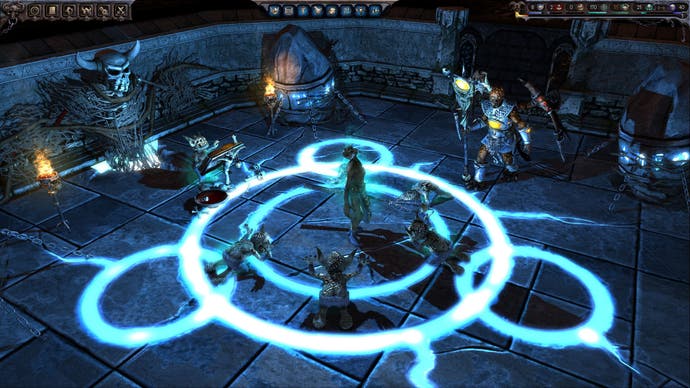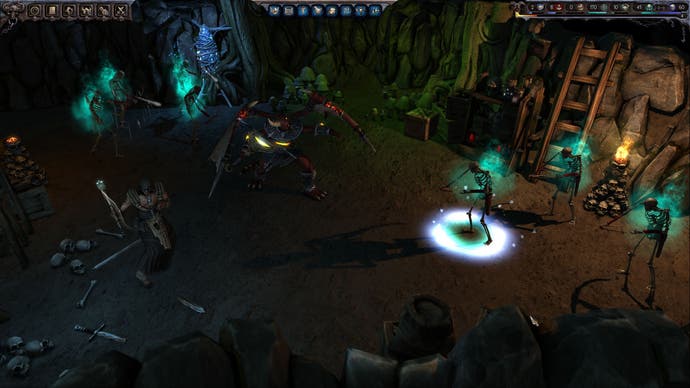Impire preview: The devil's in the details
It's not Dungeon Keeper, but Cyanide's RTS summons the spirit of Molyneux's classic.
Morality is a complex thing. I don't think we should be quick to judge and, in particular, I don't think you should be quick to judge me just because I happen to enjoy my new job as a dungeon master. I know how it looks when teams of warriors, wizards and priests travel great distances to find me and to fight me, only to find themselves pressed into service as dummies in my training room, but I want you to remember that these people are hunting me in my own home. They're walking through corridors that I carved myself and trashing all the facilities that I painstakingly assembled and arranged. They're ruining my mushroom-based economy and for this there must be Consequences.
Look around. I built all this myself, mostly with my own money (a small percentage of that may technically have been plundered, but I don't have those figures to hand right now) and these people are ruining my livelihood, the job that I've come to love, and I really do love it. When Milton wrote that it's better to reign in Hell than to serve in Heaven, I think he was saying that there's a lot more to enjoy when you work down under. There's less bureaucracy, fewer forms to fill in and more of a laissez-faire philosophy. Who cares if I cut a few corners? Or people?
Impire is a mission-based game of real-time dungeon construction and defense, of carving out self-sufficient subterranean lairs and making sure they weather the challenges of the day, be those rival dungeon masters or wandering heroes looking for loot. For those of us of a certain age, the premise behind Impire, plus its often gruesome sense of humour, will immediately summon memories of a certain classic of years gone by. If Peter Molyneux's Dungeon Keeper is not the elephant in the room when I talk to Yves Bordeleau, director of Cyanide Studios, it's certainly a demon that he's all too happy to summon up. Clearly there's some inspiration there, he says, but he's keen to exorcise the idea that this is any sort of modern-day remake. The theme is the same, but the execution is quite different.

"Of course, Molyneux is a legend and I respect that man a lot. That's why I think I like it when people say 'Hey, it kind of reminds me of Dungeon Keeper,'" he tells me. "But it's not Dungeon Keeper, and that's the point. We wanted to make a game of our own, we weren't making Dungeon Keeper 2013. It can be a little bit intimidating because people will have [preconceptions]. They'll say 'Can you add the first-person view, the camera view like in Dungeon Keeper?' But at the same time, they'll discover the new mechanics. For instance, this is not a sim. In Dungeon Keeper you didn't really have direct control over everything. Impire is more like an RTS."
In fact, the first inspiration Bordeleau cites is Dawn of War, which he says he saw as a reinvention of real-time strategy in both interface and design. Elements of its design have crept into Impire and, playing with a pretty solid build of the game (and just a week before the game is set for release), I find I'm quickly assembling squads of monsters, collections of creatures who I can then deploy about my dungeon or even send out into the wider world. Out there they storm their way about the land to collect raw materials, raid settlements or even go questing. It turns out that it's important to reach beyond the confines of your lair because there's a wider world out there with much more to be found. Who knew?
"These raids are important because the game is balanced in a way that you cannot really do or unlock everything without them," says Bordeleau, who describes these excursions as a mixture of "hit and runs" and mini-adventures where "You'll meet NPCs or solve puzzles. Some are visual puzzles, some are more like logic puzzles." And while you have minions taking these diabolical day trips you'll also still be managing your dungeon, which is also ticking over in real-time.
"You really need to be on your toes because there can be many things going on at the same time," Bordeleau explains, but he adds that one way to address this problem is to set your squads of monsters patrolling in your absence and, if you're worried about particularly nasty incursions, you might be wise to prepare something of an obstacle course for any intruders. "Traps will play a very important role in the game later on. Obviously it can get really tricky to take care of your dungeon while venturing outside, so you need to lay traps very strategically."
Interestingly, though Impire will also have a multiplayer mode, it won't involve invading other players' holdings. Instead, it's all about managing your dungeon as efficiently as possible, whilst sending out the high-fantasy squads you assemble into a common area to battle for control or to steal items. For example, the game's interpretation of capture the flag has each dungeon sending out teams to try and steal a dragon's egg and successfully return it to their own holdings to score a point. The dungeons themselves are off-limits to anyone else, but once creatures are clear of their own dungeon space then all's fair in love and warlocks.

Personally, I might prefer the opportunity to be a bit more intrusive, but perhaps The Mighty Quest for Epic Loot will scratch that itch better. Impire is more about looking to your own affairs, the complexities of digging out and defending an enclave under the earth, and Bordeleau says we should expect those complexities to grow.
He makes a point of telling me that he thinks many players will find Impire a difficult game, something that will become increasingly challenging as new elements are introduced and the game gradually becomes deeper and deeper. "We have a smooth learning curve because there's a lot of things to learn," he says. "I don't think it's an easy game, but strategy fans will really, really like to play it because there's a lot of challenge." The build I got to spend a short hour with (a paltry period of time that wasn't even enough for me to see all that the tutorial had to offer) gave me all sorts of hints towards future possibilities and I'm expecting hordes of monsters, dozens of quests and all sorts of rooms to build and caverns to explore.
Most of all, I simply want Impire to be good, because my first impressions of it are of a game that is wry, intuitive and, very appropriately, something possessed of hidden depths. It's due for release this month, so we won't have long to wait before we're able to plumb those depths ourselves and see just how far they go.

